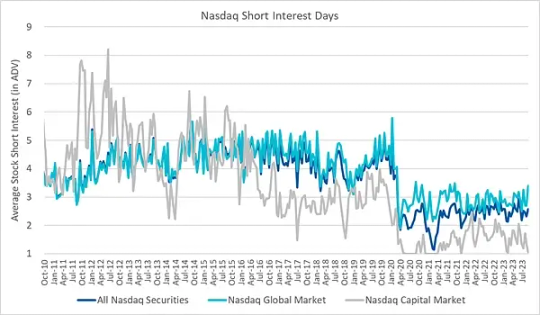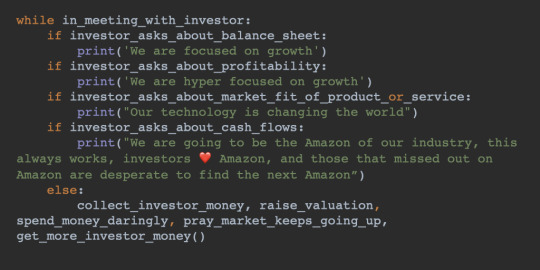#technologystocks
Text
Nasdaq Short Interest Sees Slight Uptick in Late August

Short Interest Trends on Nasdaq
At the close of business on August 31, 2023, short interest in 3,267 Nasdaq Global MarketSM securities reached 10,277,162,921 shares.
This figure marked a modest increase from the 10,165,210,409 shares reported for 3,276 Global Market issues on the prior settlement date of August 15, 2023. The end-of-August short interest represents approximately 3.40 days of average daily Nasdaq Global Market share volume during the reporting period. This was up from the previous reporting period's average of 2.70 days.
Nasdaq Capital MarketSM Shows Changes in Short Interest
Short interest in 1,771 securities on The Nasdaq Capital MarketSM, as of August 31, 2023, amounted to 1,740,359,933 shares. In contrast, the previous reporting period had seen short interest of 2,056,890,999 shares in 1,769 securities. This translated to an average daily volume of 1.05 days, down from the previous reporting period's figure of 1.35 days.
Overall Nasdaq Short Interest Overview
In summary, the composite short interest across all 5,038 Nasdaq® securities reached 12,017,522,854 shares at the settlement date of August 31, 2023. This marked a slight decrease from the 5,045 issues and 12,222,101,408 shares reported at the end of the previous reporting period. The average daily volume for this period was 2.57 days, an increase from the prior reporting period's average of 2.31 days.
Understanding Short Interest
Short interest represents the total number of shares sold short by all brokers and dealers, regardless of their exchange affiliations. A short sale occurs when a seller sells a security they do not own or one that is delivered after borrowing.
The Nasdaq Difference
Nasdaq, short for the National Association of Securities Dealers Automated Quotations, is a prominent player in the global stock exchange arena. While it may not have the same level of recognition as its counterpart, the New York Stock Exchange, Nasdaq plays a pivotal role in shaping financial markets worldwide.
The Tech Advantage
What sets Nasdaq apart from other exchanges is its unique electronic trading system. Unlike traditional exchanges that rely on a physical trading floor, they operate purely through computer networks. This technological edge allows for faster transaction speeds and greater transparency. Moreover, this automated system has traditionally made Nasdaq more accessible to smaller companies seeking to go public.
Beyond the Exchange
Nasdaq offers more than just a platform for trading. It provides a wide range of services to investors and companies alike. Market data solutions and indexes offered by the exchange inform investment decisions across various industries.
Additionally, they hosts initial public offerings (IPOs) for numerous high-profile tech firms, facilitating their capital-raising endeavors by connecting them with potential investors.
A Continual Force in Financial Markets
With its unwavering focus on technological innovation and dedication to providing efficient trading solutions, Nasdaq continues to hold a significant position in global financial markets today. It remains synonymous with technology stocks and remains a magnet for some of the biggest names in tech innovation.
Sources: THX News & Nasdaq, Inc.
Read the full article
#electronictradingsystem#financialmarkets#IPOs#marketdatasolutions#Nasdaq#shortinterest#stockexchange#technologicalinnovation#technologystocks#tradingsolutions
0 notes
Text
European Stock Market Modestly Up on Investor Optimism Ahead of Powell’s Testimony

The article reports on the European stock market’s performance, which saw modest gains on Tuesday. The market was largely driven by investor optimism ahead of Federal Reserve Chairman Jerome Powell’s testimony before Congress. The pan-European STOXX 600 index was up 0.2%, while Germany’s DAX rose 0.3%, and France’s CAC 40 gained 0.2%.
Investors were waiting for Powell’s comments on the US economy, inflation, and the central bank’s policy stance. Powell’s testimony is expected to provide more clarity on the Fed’s timeline for tapering its massive asset purchase program and raising interest rates. This information could impact global markets, including European stocks.
In terms of sectoral performance, technology stocks were the top gainers, with the STOXX 600 technology index rising 0.8%. The sector was driven by gains in semiconductor manufacturers such as ASML, Infineon, and STMicroelectronics, which all rose more than 1%.
Meanwhile, the banking sector was among the biggest losers, with the STOXX 600 banking index falling 0.7%. This was largely due to lower bond yields, which could impact banks’ profitability. Lower yields also weighed on insurance stocks, with the STOXX 600 insurance index falling 0.5%.
In individual stock news, shares of UK-based food delivery platform Deliveroo fell 4.4% after the company reported widening losses. The company said that it expects demand for its services to slow as pandemic-related restrictions are lifted. On the other hand, German online fashion retailer Zalando gained 1.5% after reporting strong revenue growth in the second quarter of the year.
The article also notes that European markets are facing headwinds from concerns over the Delta variant of COVID-19, which could impact economic growth and corporate earnings. The World Health Organization has warned that the Delta variant is spreading rapidly across Europe, with some countries seeing a surge in cases. This has led to renewed restrictions in some regions, which could weigh on consumer spending and business activity.
In addition, the article highlights the ongoing tension between the US and China, which could also impact European markets. The US has imposed sanctions on Chinese companies over alleged human rights abuses, while China has responded by threatening retaliation. These tensions could impact global trade and economic growth, which would in turn impact European markets. Read more.
#EuropeanStockMarket#Investing#FederalReserve#JeromePowell#TechnologyStocks#BankingSector#InsuranceStocks#COVID19#DeltaVariant#USChinaTensions
0 notes
Text
The Tech Reset, it's a Good Thing
The NASDAQ closed down for the seventh straight week.
The fall in technology stocks is reminding investors of the dot-com bubble burst.
The fall in tech is a good thing and will allow investors to reconsider how they value tech companies in the future.

The Nasdaq closed down for the seventh straight week, recording its longest losing streak since 2001. For anyone who isn't sure, a reset in tech is underway.
Two weeks ago, David Sacks, a co-founder of PayPal ($PYPL) and a general partner of Craft Ventures stated that the current tech environment is the worst he’s seen since the dot-com crash. This coming from someone who survived the dot-com bubble burst.
The decline in the NASDAQ might be painful, but it's necessary. It's time to separate the real from the fluff.
To read the full article: https://bit.ly/3lABp5g

#stocks#investments#Investing#StockMarket#BearMarket#NASDAQ#Tech#TechStocks#TechnologyStocks#Technology#silicon valley#Tech Layoffs#dotcom bubble#Apple#Amazon#PayPal#Adobe#InvestmentEducation#FinancialEducation#MoneyEducation
1 note
·
View note
Text
A Warning Flashing From Tech-Heavy Leveraged ETF
Technology bulls beware of the hourly chart of this leveraged ETF....
#bulls #bears #sp500 #earnings #stockmarket #spy #newsletter #QQQ #xlk #tecl #technologystocks
AS SUMMER COMES TO A CLOSE, THE HOURLY CHART OF A LEVERAGED TECH-HEAVY ETF IS CAUTIONING POTENTIAL WEAKNESS AHEAD
NVIDIA Corp (Ticker: NVDA) printed blow-out earnings, ultimately providing upward lift and support for the stock market as a whole. However, as of this writing, investors have a cautionary signal to consider during the sell-off taking place in the highly leveraged tech-heavy Direxion…

View On WordPress
0 notes
Text
Dell Sells Off on Weak Server Sales – Does It Offer a Buying Opportunity?

Dell Technologies (NYSE: DELL) saw its share price fall as much as 14% on Friday after reporting that softer server sales led to lower than expected revenue growth. The company’s 1st quarter EPS beat estimates, but revenue was $240 million lower than expected, and just 2.2% higher than the 1st quarter of last year.
This was the second time Dell has reported since returning to the public markets in December. Since its IPO the stock price has risen 66% as increasing numbers of analysts re-initiated coverage.
Adjusted EPS of $1.45 was well ahead of the $1.16 consensus estimate, but the market focused on the revenue figure which came in at $21.9 billion. Dell is the latest in a long list of hardware businesses to be hit by slowing demand for servers. Although revenue growth was disappointing, Dell did swing back to a profit, with quarterly net income of $293 million versus a loss of $636 last year.
PC Sales Still Going Strong
While the server business suffered, the PC business benefited from Microsoft’s plans to phase out of Windows 7 support which prompted customers to upgrade their PCs.
The Client Solutions Group, which includes desktop PCs, notebooks, and related hardware, saw a 6% year-on-year uptick in revenue. This was also better than analysts had hoped for. Commercial revenue from the group grew 13%, while consumer revenue fell 10%. The operating margin for the group was 7%.
The Infrastructure Solutions Group, which includes servers, networking products, and storage, saw revenue decline by 5%. The demand slowdown was most notable in China. While servers and networking revenue fell 9%, storage also fell 1%.
VMware, the software virtualization company of which Dell owns 81%, saw revenue growth of 13% and generated an operating margin of 26.9%. The unit that now accounts for around 10% of total revenue also reported its 1st quarter earnings yesterday.
There Are Two Sides to the Dell Story
Dell’s stake in VMware means there are two sides to Dell as an investment. On the one hand, we have the legacy PC, server, and storage business. Dell is a well-known brand with substantial market share – but growth is pedestrian, and margins are low.
On the other hand, its stake in VMware is worth far more than Dell’s own market value, suggesting an obvious opportunity. Dell has a market cap of $47 billion, while it’s 81% stake in VMware is worth $58 billion, though it also has debt of about $40 billion.
If VMware continues to grow and contribute more to Dell’s earnings, and if interest rates remain low, the investment will pay off. If, however, VMware stumbles, Dell’s debt will become a problem. This makes Dell a high beta play on the tech sector.
Given the slowdown in server sales, uncertainty is warranted, but may also offer opportunities. Dell may be best viewed as a trading play, using sentiment and technical levels rather than trying to guess where the fundamentals are headed. Friday’s low of $57 is turning into a key level, If a base forms there, traders can use it as an inflection point to trade off.
Read the full article
0 notes
Text
OneSoft Solutions (OSS) Might Not Be a Penny Stock for Much Longer
OneSoft Solutions Inc. (TSXV: OSS), more than doubled its stock value during the year. Read on to find out why it won't be a penny stock for much longer. #techstocks #stocks $OSS $OSS.V
Read the full article
0 notes
Text
2 Tech Stocks that Could Cash in on Canada’s Marijuana Boom

With North America’s war on cannabis slowly coming to an end, marijuana growers and technology companies are becoming friends. The synergies between the two sectors has unleashed a flood of ‘weed tech’ companies offering everything from seed-to-sale services to data analytics to e-commerce stores. Below, we’ll draw your attention to two weed tech stocks that are bringing innovation to the cannabis arena.
"Weed Tech" Companies
Blockstrain Technologies Corp (TSXV: DNAX)
Future Farm Technology (CNSX: FFT)
Blockstrain Technologies Corp.
Ticker: DNAX
Market Cap: $22.9 million
Annual Revenue Growth: N/A
The cannabis industry has expanded rapidly over the past five years without addressing a key area of concern for growers and breeders: intellectual property protection. Vancouver-based Blockstrain has developed the cannabis industry’s first IP tracking platform, helping market participants secure rights for their intellectual property.
Incorporated in November 2017, Blockstrain is difficult to analyze from an earnings and revenue point of view because it doesn't have comparable figures. The company reported a comprehensive loss of $1.6 million for the three months ended Jan. 31, 2019. Funds in operation totalled $1.4 million during that quarter and were mostly used to cover marketing costs. Earlier this year, Blockstrain announced it had signed an agreement with Harvest One Cannabis Inc., a licensed producer, to employ the company’s genome tracking software.
Blockstrain represents an interesting marriage between two of the fastest growing segments in the market today: blockchain and cannabis. If it behaves in any way like a crypto proxy stock, its short-term performance could be influenced by the health of the blockchain industry as a whole. At roughly $0.30 a share, DNAX could become an interesting play once it has comparable sales and earnings data.
Future Farm Technologies Inc.
Ticker: FFT
Market Cap: $2.5 million
Annual Revenue Growth: 184% (2019)
Vertical farming – the practice of growing food and other goods in vertically stacked layers – represents the next major innovation in crop production. For marijuana specifically, vertical farming allows producers to scale up capacity without having to acquire more land. Against this backdrop, Future Farm Technologies emerges as a pivotal player.
The company holds a worldwide license for its vertical farming patented technology, which includes redesigning greenhouses to allow for layered crop production. Instead of relying on sunlight, FFT’s vertical farming centres use LED lights and advanced hydroponics. This is another type of controlled environment agriculture (CEA) that has really taken off in recent years.
FFT considers itself to be a “diversified cannabis company,” providing cultivation, processing, retailing and technology services for the marijuana industry. It recently secured a license to expand production in Florida, adding to existing facilities in Rhode Island.
Keep in mind Future Farm Technologies is a micro-cap stock that has only been in operation for a few years. This means it is extremely volatile, as evidenced by its performance in the last five months. As a penny stock, it is currently trading at less than three times its peak. The stock got a huge boost last summer thanks to surging revenue and a deal to bring holographic display and telepresence technology to the marijuana sector.
Conclusion
Weed tech is one of the most exciting corners of the marijuana market. Stocks like DNAX and FFT are extremely volatile but provide a tantalizing look at where the market is headed.
Read the full article
0 notes